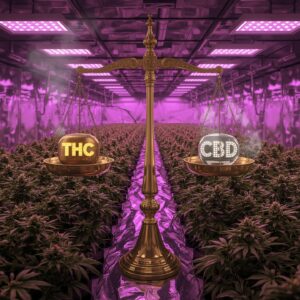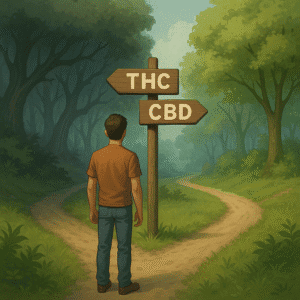Cannabis and anxiety, the perfect example of how two similar stories can be vastly different. We may all be human, yet our experiences have been disparate since the time our brains began developing in the womb. We often have a sixth sense about whether an experience will be good or bad, though not always. So, let’s explore some real-life examples and then put some science behind them.
Real-Life Experiences

Let’s look at two tales where cannabis helped calm the storm, and two where it made anxiety spiral, straight from the front lines of Reddit.
When Cannabis Helps
- 1)“…my work and school have improved; my concentration has gotten better without all the racing thoughts… weed has completely helped me calm down better than any meds I’ve been on.” Reddit
- 2)“We’ve found that it can really help by taking that edge off of anxiety … helps with shaky hands and that shallow rapid breathing…” Reddit
When It Makes Anxiety Worse
- 3)“I started to randomly get intense panic attacks (Heavy breathing, rapid heartbeat… feelings of dying…)” Reddit
- 4)“…smoking bud and carts heavily daily… every time I get high, I have awful anxiety attacks and paranoia…” Reddit
Points to make & what to take away from this:

Point 1 states that it improved concentration and calmed them down. This is exactly what cannabis can do in small, regulated doses, taken as a medicine rather than as a form of entertainment. The side effects are minimal, and the damage to your body (if consumed correctly) should be negligible.
Point 2 highlights that, for someone who already has anxiety, their endocannabinoid system may be failing them. This could stem from trauma, chronic stress, or a natural imbalance. In such cases, cannabis is being used to help restore balance to the ECS (endocannabinoid system), often a highly effective solution for those in that situation.
Point 3 is a classic case of long-term use. He had been smoking cannabis for around 10 years when symptoms began to appear. Over time, his body had become fully reliant on the THC and CBD he was consuming, to the point where natural balance was severely disrupted.
Points 3/4 both describe experiencing emotions no one would wish on their worst enemy. Both were heavy users, either too frequent or at too high a dosage. Symptoms such as anxiety attacks, paranoia, rapid heart rate, and an overwhelming sense of impending death were reported. This is a clear sign to stop immediately.
My own life experience

My own lifestyle has given me tremendous experience with both sides of these stories. Cannabis got me through much of my trauma, fear, and depression. I went from using it every day, multiple times a day at very high dosages, to smoking very little once a day, and eventually to only using it once a week.
Unfortunately, I almost always fell back into heavier use. Cannabis became my go-to medicine, or drug, for everything. By the time I was in university, it had finally caught up with me. Working long hours until 4 a.m. I began smoking heavily again, once a day, mainly to sleep.
Months later I decided to cut back to once a week. My body was not happy with this decision; stress turned into fear, which turned into anxiety, which escalated into full-blown panic attacks. Random moments in my day suddenly became fight-or-flight situations. I would feel an overwhelming sense of dread, even the smell of death, while overthinking pointless topics, whether I was just doing the dishes or watching a movie.
I knew it was the withdrawals I was experiencing. Having gone through those feelings, I realized I could never go back. It simply wasn’t worth it. Feeling like you’re about to die at random moments is not a side effect I was willing to accept.
Science Behind it all

How can it be your friend
THC: Low dosages of THC can reduce anxiety in the short term. It’s recommended to use it no longer than a month, up to three times a week. After that, at least a one-month tolerance break should follow.
CBD (the King/MVP): CBD reduces anxiety at nearly any tested dosage. This compound is designed to do the job without causing mental or internal side effects. It regulates gently, without creating imbalances in dopamine and anandamide (the “happy molecule”).
Recommendation: This is not medical advice, only an opinion from someone who studies the subject and has personal experience. Full-spectrum CBD oil drops are the most effective for purposes such as improving sleep, reducing anxiety and depression, and even enhancing mood.
Why it turns into foe
High THC doses: Can ramp up anxiety, paranoia, and panic attacks. It’s literally a volume-dependent ride.
Edible risks: Even small amounts of today’s ultra-potent edibles have triggered chronic anxiety and derealization in people who were previously fine. Doses of 30mg or more can be dangerous, even for those with experience.
Self-medicating: May backfire. Higher THC use, paranoia, and addictive patterns often take control — especially when cannabis is used purely for entertainment. We begin relying on it for mood enhancement and lose the ability to produce that feeling naturally.
Habitual use: Can erode the brain’s reward and stress systems, leading to dependency and withdrawal anxiety. We’ll dive deeper into this topic later in the post.
How to navigate this journey: Using cannabis safely for anxiety

Go see a pro not Dr Google
Do not make decisions based on your friends’ or family’s recommendations. They may have a lot of experience, but their opinions are still biased. Google won’t help much either, since there are thousands of conflicting “facts” about this drug. One size does not fit all. The best step is to see your doctor, psychiatrist, or physician.
Low dosages
Once you have a prescription or recommendation from a professional, keep the dosage low and stick to healthy methods of consumption, such as oils. Don’t go off on your own tangent and self-medicate with higher doses over any period of time.
CBD is your friend
Sticking with CBD is the safest bet, especially if you plan to use it long term. Low dosages are often just as effective as high ones.
Monitor and adjust
Stay in tune with your experiences. Make sure what you’re taking is doing its job, and nothing more. Watch out for side effects such as tiredness, lethargy, nausea, cramping, or faintness. Our body chemistry is always fluctuating.
Red flags
Derealization: If you feel yourself slipping away from reality, stop immediately and seek professional help. People often find themselves in liminal states of mind, which can be confusing and stressful.
Increased signs of dependency: While it’s reassuring to know THC or CBD is working for your anxiety, be mindful if your mind and body begin to depend on it. This is what leads to addiction.
Long-term use: If you’ve been using THC or CBD for over a year, be aware that it may no longer be serving as effective medicine. Other underlying conditions might need to be addressed to resolve anxiety permanently. These compounds should not become a crutch.
Deeper dive into the why, how, when and how long of cannabis and anxiety/panic attacks.

Since the depth of this topic goes extremely far, I’ll be making a separate post on it. The link can be found in the title. Cannabis affects us in major ways, both positive and negative, thanks to how compatible it is with our internal systems.
Cannabis plays such a big role that it can begin to take over natural functions our bodies are used to handling. When THC and CBD regularly interact with these systems, the systems tend to step back and allow the compounds to do the work, ultimately weakening their own ability to function.
It’s similar to taking Allergex for allergies. The medication doesn’t remove your allergies; it suppresses your nervous system, making it less responsive to triggers like pathogens. This makes you less reactive and relieves your symptoms, but also creates a higher risk of catching the flu.
Final say
Cannabis can be both a solution and a disruptor; the line is thin, dose-dependent, and highly personal. Start with CBD, tread lightly with THC under medical guidance, pair it with therapy, and always stay self-aware. Play smart, not scared. Use it with purpose, not for entertainment.
Addiction to cannabis has become a greater issue in recent years, as strains continue to grow stronger through advanced methods of cultivation, splicing, and crossbreeding. Know what you’re getting into.
